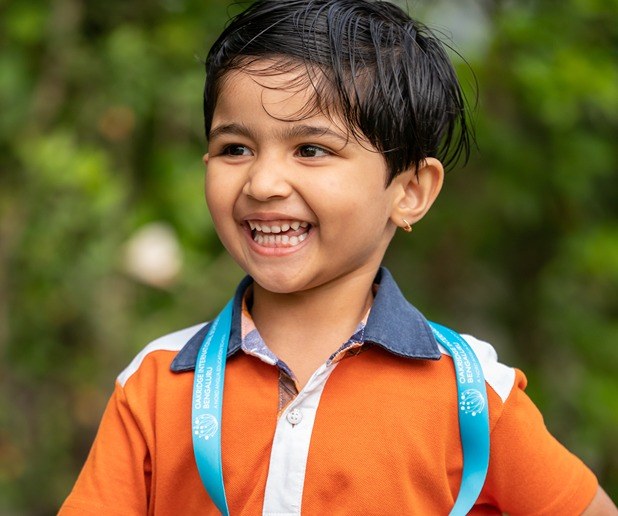Development of Social Skills during Early Years
- 17 April 2023


“Children learn as they play. More importantly, in play, children learn how to learn.”
Children at play explore and express themselves better. It supports the development of social skills, which are crucial to their overall development. These skills include their ability to interact with others – for example, communicate, cooperate, share, empathise, and resolve conflicts effectively. These skills ensure how adept children become in their social life, making friends and sustaining friendship and helps them thrive in their personal and professional life. This blog will explore the importance of social skill development in the early years and how parents and early childhood educators can support the same.
0-12 months
The most crucial social skill children develop during their early years is communication. Infants (0-12 months) begin to communicate through crying, cooing, and facial expressions. During this time, the focus is on developing a relationship of trust and attachment. Parents and caregivers can support social development by providing responsive, consistent, and loving care, which helps infants feel secure, supported, and loved. Children begin to develop the ability to read social cues and respond appropriately, such as smiling in response to a parent’s smile, waving hands excitedly seeing loved ones, etc.
1-3 years
As infants transition to become toddlers (1-3 years), they start to use words and enhance language usage. They begin to explore their environment and interact with others, learn to use language to communicate their needs and feelings, and develop the ability to understand and follow simple instructions. Children begin to develop a sense of self and emotions, such as excitement, joy, and upset. It is important that during this time, parents and caregivers encourage the development of communication skills by engaging in conversations with the child, by reading to them, by encouraging them to express themselves through play, exhibiting respectful social behaviours and language, and setting clear and consistent boundaries.
3-5 years
Preschool-aged children (3-5 years) continue to work on these social skills through play and interacting with others. They begin to understand and follow more complex rules and instructions, use language to express their thoughts and feelings and show empathy and consideration for others. Children develop a greater awareness of social norms and expectations, like taking turns, sharing with others, and using polite and respectful language. Early childhood educators at Oakridge International School strengthen these social skills by providing opportunities for group play and activities, encouraging problem-solving and conflict resolution, and reinforcing positive social behaviours.
Empathy and self-management
Empathy and self-management are two other crucial social skills that children start to develop around the age of two and continue throughout childhood. Empathy is the ability to understand and respond to others’ feelings. Self-management involves the ability to control one’s emotions, behaviour, and attention. Children start observing their surroundings and imitating the behaviour of others and the ways they respond from an early age. Adults can foster empathy development by engaging in conversations with children, modelling empathetic behaviour, acknowledging their emotions, and encouraging them to express their feelings. They learn self-management through guidance from adults through expectation setting and providing opportunities for them to practice self-control.
Development of social skills
The development of social skills is a complex process that involves various areas of a child’s brain, including the prefrontal cortex, amygdala, and the mirror neuron system. These areas of the brain help a child understand and respond to social cues, emotions, and behaviours of others in a positive and meaningful way. Hence, the early years, from birth to age five, is the most critical period for social skill development. This is the best time to learn how to express and manage their emotions, as well as how to collaborate with others through effective communication – listening, understanding, and responding. Playtime presents perfect opportunities for children to learn these skills by observing, experiencing, and applying the same while socialising with others. By promoting the development of these social skills, parents and caregivers can help children build healthy relationships and prepare them for success in their personal and professional lives.
Soma Tapadar
EYP Coordinator

Hyderabad, Gachibowli

Hyderabad, Bachupally

Visakhapatnam

Mohali
Bengaluru
2 Comments
I respect your work, appreciate it for all the useful content.
Glad to be one of several visitants on this awe inspiring website : D.